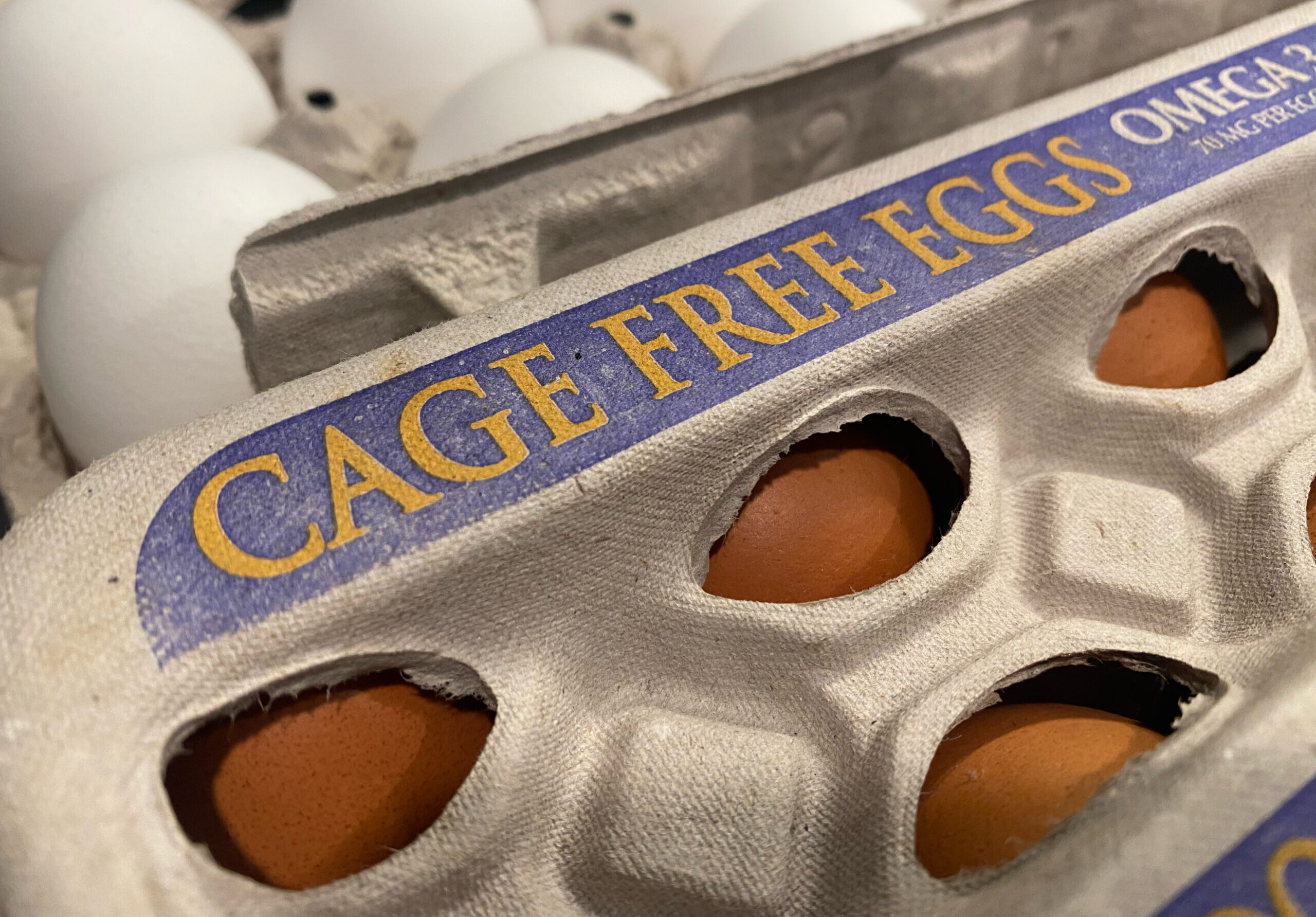ANNAPOLIS, Md. — A bill promoting cage-free eggs once got people excited but now it’s stuck in committee, leaving sponsors uncertain if its future is on the sunny side.
The measure would require all shell eggs raised or sold in Maryland to be cage-free by 2026. This would prohibit Maryland farmers with over 3,000 egg-laying hens from using what’s known as battery cages, or conventional wire cages where hens are kept in close confinement. The law would also require any eggs sold in Maryland supplied by other states to be cage-free.
“I think that we should be treating animals humanely,” said House lead sponsor Del. Jennifer Terrasa, D-Howard County. “I think that’s the bottom line.”
But despite early optimism, Sen. Karen Lewis Young, D-Frederick, the Senate sponsor, tells Capital News Service she doesn’t expect the bill to advance this session, even though she thinks cage-free eggs are “inevitable.”
A stalemate would be at least a short-term win for agricultural interests in their ongoing national fight with animal rights advocates. The Humane Society has been advocating for cage-free eggs across the country, recently launching a six-figure advertising campaign for this legislation in Maryland. Some farms have adopted cage-free practices voluntarily.
Many farmers are against putting the requirement in law because of the increased cost of production, short phase-in period and potential for their birds to experience heightened health risks outside of the cage. Farmers want to make their own decisions for how to best raise their birds.
Some advocates are surprised the legislation hasn’t been successful in Maryland as other states passed similar laws regarding cages for farm animals. It’s “rare” for Maryland to be behind on humane legislation, said Jennifer Bevan-Dangel, Maryland state director for the Humane Society of the United States.
“We’ve looked at what we consider the cruelest confinement practices,” Bevan-Dangel said. “And these battery cages are one of the most inhumane tools that are still being used when we look at the farm animal landscape.”
If the bill were to pass, it’s estimated that six million birds would come out of cages, Bevan-Dangel said. About 11 farms that produce shell eggs in Maryland meet the criteria of 3,000 egg-laying hens, Bevan-Dangel said, but the sale prohibition would affect birds in other states as well.
According to state numbers, approximately 600 million eggs were produced in Maryland in 2022. About 10 million of those eggs came from smaller farms with fewer than 3,000 hens, which Bevan-Dangel said often use cage-free practices anyway.
But the farming community has pushed back on the legislation vigorously, citing financial concerns they say could put them out of business. Should surrounding states decide not to ban battery cages, Maryland farmers could be disadvantaged in the egg market, said Tyler Hough, director of government relations for the Maryland Farm Bureau.
“We would be forced out of business, our employees out of work,” said Bill Dix of ISE America, a Maryland-based egg producer.
Some opponents argue there are cases where cage-free housing systems could even have negative effects on the welfare of hens. Access to the ground and other birds means more exposure to diseases, parasites and pecking order injuries, said veterinarian Matthew Weeman, legislative chairman for the Maryland Veterinary Medical Association.
The Maryland Veterinary Medical Association did not take a position on the bill but submitted informational testimony. Sometimes a cage is better for a bird and sometimes it isn’t, said Weeman.
“We don’t need a legislative mandate that says here you have to raise the bird this one way because that one way may not stand the test of time in perpetuity,” Weeman said.
Many supporters of the bill argue that the egg industry is increasingly shifting toward cage-free practices anyway. By June 2023, according to the USDA, the share of cage-free hens increased to 38% of egg-laying hens in the U.S. Even large restaurant and grocery chains have made cage-free commitments, thus contributing to the increase in cage-free practices.
Weeman says this shift is not by industry choice, but instead by the work of activist groups. Some farmers are just giving in to the public pressure, he said.
Mandating cage-free eggs could price people out of buying eggs, farmers argue. In a 2023 report, the United Egg Producers determined that if regular eggs are taken from the market, the number of consumers who will forgo buying eggs will increase by 20 percentage points.
But Terrasa said this legislation would remove the cost of the premium for cage-free eggs, thus opening access to all Marylanders.
“I paid for it, that’s fine,” Terrasa said. “But I think everybody should be able to make that same ethical decision without the cost of the premium on it.”

